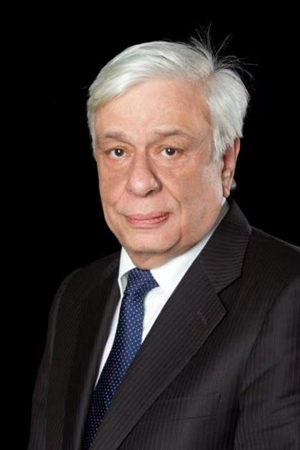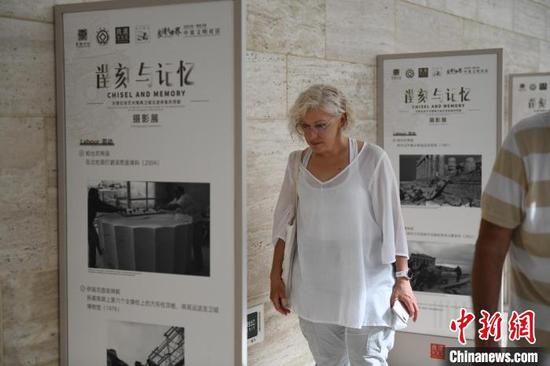(W.E. Talk) Prokopios Pavlopoulos:Why is the dialogue between China and the West so important?
—— Exclusive interview with Prokopios Pavlopoulos, Former President of Greece & professor at the Law School of the National and Kapodistrian University of Athens
by Yan Ge, Xie Panpan, Tong Xiaoyu

Prokopios Pavlopoulos. Image provided by Pavlopoulos' office
(CNS)-- In February 2023, the China-Greece Center for Civilization and Cultural Exchange was established in Athens, Greece. Chinese President Xi Jinping sent a letter highly praising the center and advocating for strengthened cultural exchange and mutual learning, insisting on inclusiveness and openness to promote the continuous development and prosperity of human civilization, and to bring benefits to all civilizations and humanity.
Chinese civilization has a long history, and ancient Greek civilization has a profound influence. From July 5 to 6, the Liangzhu and the World — "Liangzhu Ancient City·Acropolis of Athens"- China-Greece Civilization Dialogue event will be held at the Liangzhu site, a sacred place with a history of five thousand years of Chinese civilization. In an exclusive interview with China News Service's "W.E. Talk", former Greek president and professor of law at the University of Athens, Prokopis Pavlopoulos, discussed the significance of China-Greece cultural exchange and mutual learning, as well as its power in promoting the construction of a community with a shared future for mankind.
The interview content is summarized as follows:
China News Service: The friendship between China and Greece has a long history. What is your impression from the past when you and President Xi Jinping jointly promoted exchanges and mutual learning between Chinese and Greek cultures during your tenure?
Prokopios Pavlopoulos: The two visits remain deeply etched in my memory, mine, as the President of the (Greek) Republic in China and the visit of President Xi Jinping to Athens in2019.
They were two historic visits, I stress that, I will never forget, that is why I consider that this visit was historic, among other things, the dialogue we had, in Beijing, with President Xi Jinping on the essence of culture. He, speaking about the cultures of Asia and the Far East and I speaking as a kind of representative of the West and especially of Greek culture which is the matrix, the basis of Western and European culture.
Then we came to the conclusion, which we also confirmed in Athens, that the most important, the most solid support of civilization, of civilization itself, is dialogue because it promotes the essence of civilizations. And I remember that we later came to the position that this dialogue had to be continued in any way and we continued this dialogue and we now continue it.
And in fact, it is of great importance that this relationship between Greece and China, China and Greece proves that economic relations are not so important, and these have their importance and we know that economic relations between Greece and China, Greece and China are very important, but the cultural relations are deeper, they have deeper roots, they touch the essence of human, the relations of peoples.
And this is extremely important especially in today's era, an era that shows how much human, social justice is going through a huge adventure, the inequalities that exist. All this shows that we must defend man. And man can only be defended through the defense of culture.
That's where we ended up at that time and I think these two visits have laid the foundations for the relations of our countries and our cultures to go far, as they start from far away, go far. I, personally, but Greece in particular, owe this to China and to President Xi Jinping, who, precisely because of the essence of his views on culture, has given another dimension to the dialogue of cultures in general.
China News Service:China and Greece are both ancient civilizations. In what areas do you think China and Greece can learn from each other? What effect will exchanges and mutual learning between cultures have on the development of the two countries?
Prokopios Pavlopoulos:I said before and I repeat, the economic relations are good but the cultural relations are deeper, especially for two countries, like Greece and China, China and Greece that have ancient cultures. These civilizations are many thousands of years old and I emphasize that we have the possibility through the dialogue of civilizations to give an important answer to the question of how we contribute to the consolidation of world peace and the protection of man and his rights.
The real cultures, such as the culture of Greece, the culture of China, do not collide, they have dialogue. Sometimes there may be obstacles in this dialogue, there are weaknesses in communication. But precisely within the dialogue we should not make divisions. Instead, we need to build bridges.
The essence of Greece and China in terms of their culture is that our cultures are real cultures because they are human-centered. Every real civilization has man at its center. So for years the two countries have this great tradition which they must take advantage of. Through the dialogue these two great civilizations, the ancient civilizations can contribute to promote world civilization.
World culture is a great river and this great river of world culture is nourished, grows and becomes more intense and at the same time more conducive one would say, to advance the essence of man, precisely through the contribution of individual cultures.
Regarding the relations between Greece and China in culture, I would like to say this so that one can understand how deep the roots are despite the fact that this happened in times when the two cultures did not communicate. If one sees, for example, the philosophy of Confucius, he will understand, no matter how little, you know, are the evidence we have about Confucius, we at least, in the Western world, will understand how many points he had in common, especially with regard to the ideal man, harmony, the excellent leader, how much he had in common with Plato and Socrates.
But not only with Plato and Socrates but also with Aristotle, especially with regard to justice. And we see this today. So we Greeks have greatly appreciated this dialogue. We have appreciated the initiative we took then with President Xi Jinping, and this initiative is developing to a significant extent now recently, when following a decision by President Xi Jinping and the Academy of Athens, the dialogue will be conducted through the major academies, the Academy of Athens and both major academies of the People's Republic of China. We, from the side of the Academy of Athens, are ready to promote this dialogue.
We are ready to co-sign a memorandum of cooperation, which will show what the prospects are for such a dialogue and this dialogue, we owe it, as I said before, to world peace, we owe it to man, who is going through so many adventures today. Our times seem easy but they are not. We have not utilized either the technology or in general the means at our disposal, the many means at our disposal to dedicate them to the service of man.
Only in this way can we promote world culture. Only in this way can we understand why the relations between cultures and especially the great civilizations, the ancient civilizations, of Greece and China, China and Greece can contribute to the great goal- as I said and I repeat it, perhaps with some obsession- to the world peace.

China News Service:The site of the Liangzhu and The World—"Liangzhu Ancient City·Acropolis of Athens" Chinese-Greece Civilization Dialogue,the Liangzhu site in China is an example of early human urban civilization, a world cultural heritage and a sacred site that demonstrates the 5,000-year history of Chinese civilization. Do you have any thoughts on the dialogue between the two ancient civilizations this time in Liangzhu?
Prokopios Pavlopoulos: We also know here in Greece the history of the province of Liangzhu and the capital, if I'm not mistaken, which is Hangzhou, we know that there,5,000 years ago, in the Neolithic Age, an early Chinese civilization was created. Let's think that then the Greek civilization, the ancient Greek civilization, was starting to take its steps. So,(there is) another meeting point. And I think, precisely to honor the essence of this culture, and this province together with others of course, but also this province Liangzhu, gives us a field where we can meet.
I would really like to, and as I said, through the collaboration with the Athens Academy we can see this. What does this cultural, shall we say, root of Liangzhu teach us? It teaches us that the great ancient civilizations are like trees, the deeper the roots of the trees of civilization, the longer these trees last, grow, bear fruit and this is extremely important because a civilization does not only have a history, it must also have perspective.
To only look back and think about what are the cultural creations of each country maybe this helps the history but it does not help the present and the future. And history is to teach us, to learn it, not only to know what happened before but to be able to learn even from our mistakes or from the human potential and move forward. So Liangzhu and Hangzhou are two regions, one region, in essence, one is the province, the other is the capital so to speak, where this dialogue could really take place.
And as I said before, through cultural relations and through cooperation, through the academies, I think this is very possible. As long as we prepare it with great patience and at the same time be able to devote enough time to it. Our times, today's times require us to be always on the alert and here we are (alert) and I stress this, we thank you very much for this contribution from China's side to the dialogue of civilizations. It is a global mission, which we must repeat and this, I will repeat again, for man, for peace and justice.
Prokopios Pavlopoulos was born in 1950 in Kalamata, Greece. In 2015, he was elected President of the Republic.
